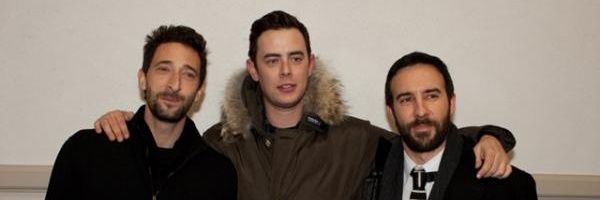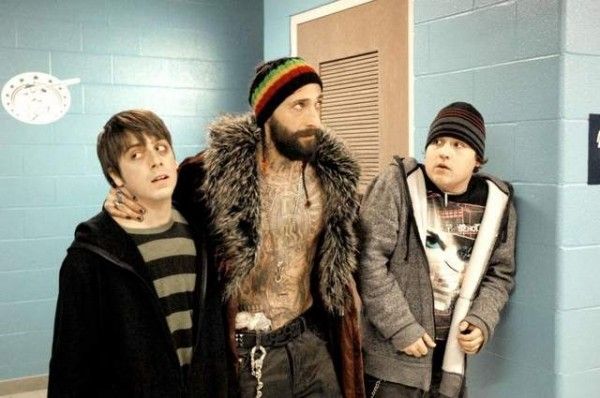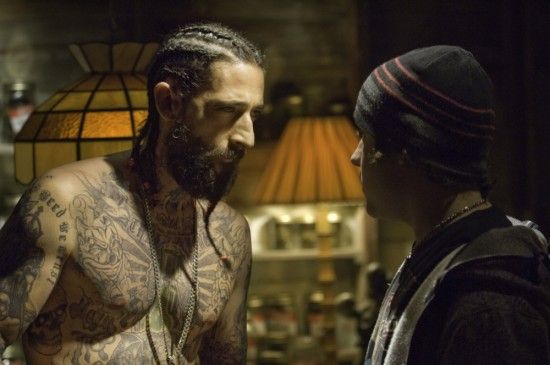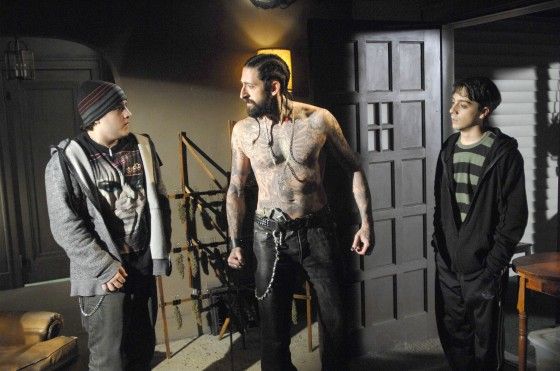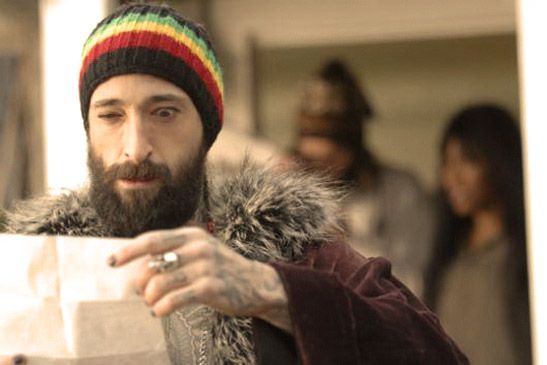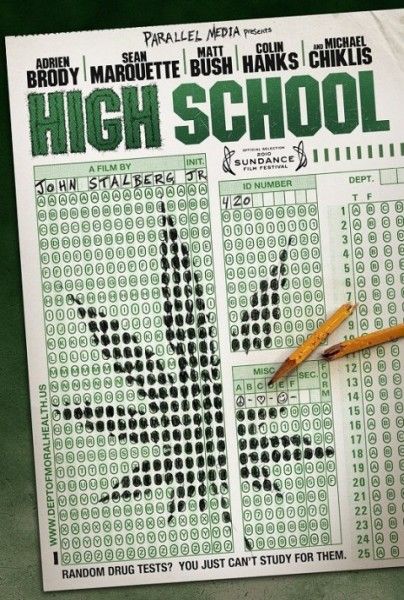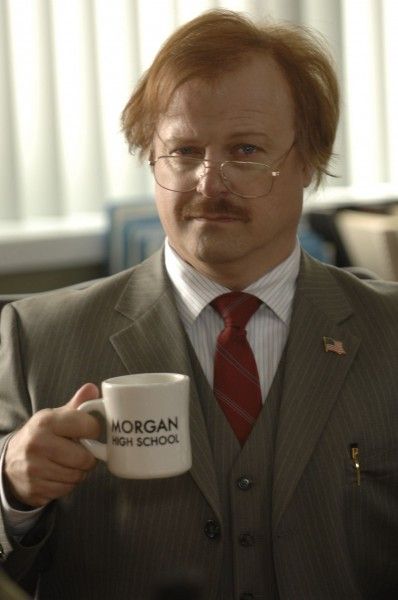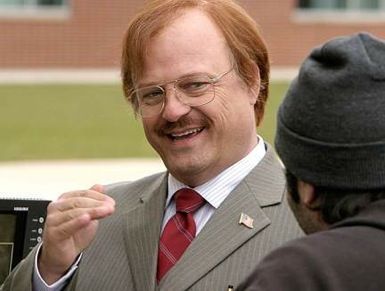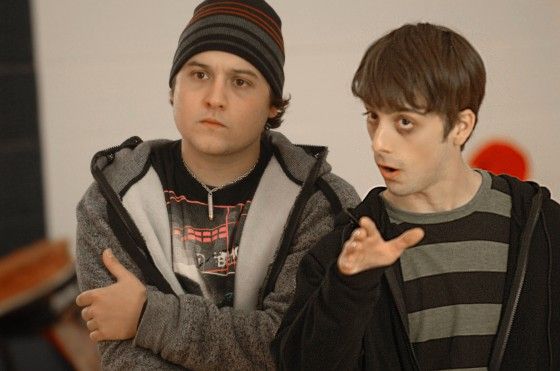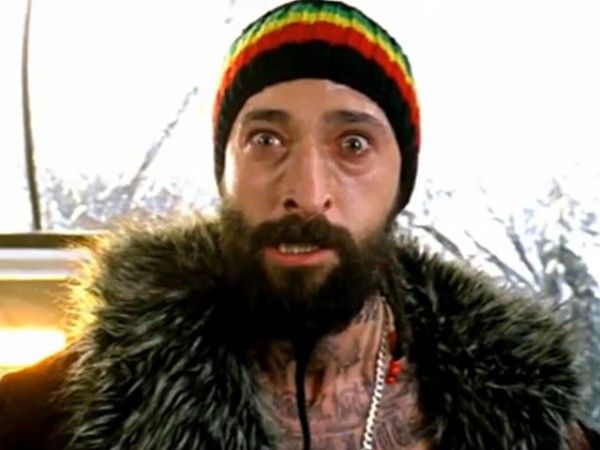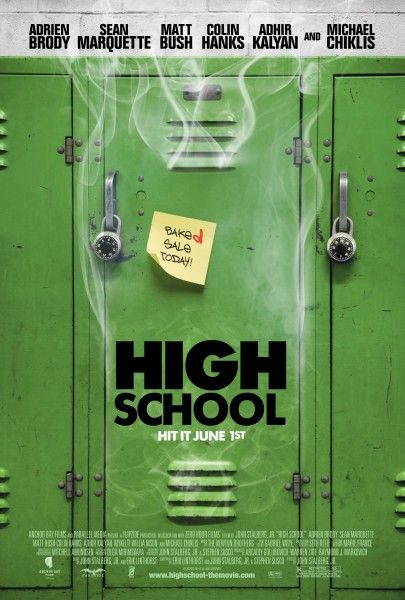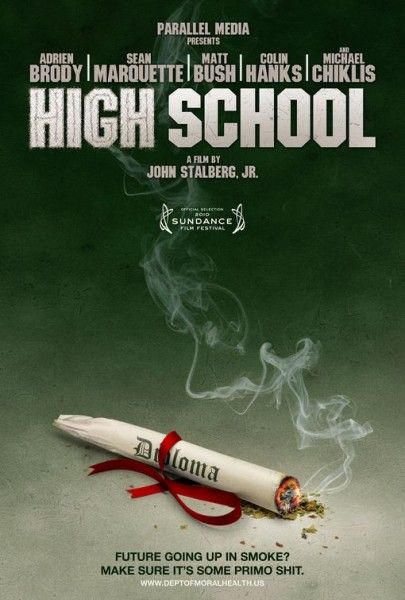Co-written and directed by John Stalberg, High School focuses on soon-to-be valedictorian Henry Burke (Matthew Bush) who smokes pot for the first time, then discovers that a mandatory drug test has been scheduled at school. He teams up with his stoner friend Breaux (Sean Marquette) to make sure everyone fails. Together they spike the school’s bake sale brownies with high-powered ganja stolen from law-student-turned-drug-, Psycho Ed (Adrien Brody). Their half-baked plan goes up in smoke when Psycho Ed realizes his prized stash has been used to get everyone in the school stoned out of their minds.
At the press day for High School, we sat down for a roundtable interview with actor Colin Hanks and director John Stalberg to talk about their recent collaboration and how they set about turning the concept of a stoner comedy on its head. Hanks described what attracted him to the role, what the directing process was like, why Psycho Ed has got nothing on Male Page, and his upcoming film, The Guilt Trip, and his plans to direct a documentary. Stalberg, an expectant father, compared delivering a film on time and on budget to impending parenthood and revealed his collaboration with Richard Kelly on Owen’s Manual and the possibility of a High School sequel called Juvie. Hit the jump to see what they had to say.
Colin Hanks: (noticing the low ceiling and unusual 60s décor of the room) This place is so dark. All of a sudden it’s like incredibly bright. This feels like a Kubrick room. Do you know what I mean?
Q: It’s the forced perspective.
Hanks: This is like Kubrick’s A Clockwork Orange. Whoever designed this place was on acid. There’s no doubt about that. That’s a different movie, but …
How Method did we get with this performance?
Hanks: Uh oh…
John, what’s more nerve wracking: getting your first feature film done or awaiting the birth of your child?
John Stalberg: Ummm…
Hanks: There is a wrong answer, by the way.
Stalberg: You know that’s what I was about to say. Watch me dodge this one. They’re both really terrifying and they’re both really incredible things to happen, especially at the same time. They’re both happening at the exact same time so it’s pretty wild.
It’s no coincidence that they say you deliver the film on time and on budget. It’s a delivery process.
Stalberg: It’s true and my daughter is going to be delivered late. Thank God the film was at least on time.
Hanks: Some people receive medication in order to properly deliver films. I mean, it’s true.
Speaking of receiving medication, when you approach this, do you say let’s just go to the wall, guys? The research alone has got to be really exhausting?
Stalberg: It’s really tiring stuff. I’m going to steal a line from Adrien (Brody). He said this at Sundance when we premiered it. He had a lifetime of research for this role, a lifetime of preparation. You’ve got to draw from a lot of fun, crazy stories in your past to do something like this.
How sober were you when you wrote, designed and shot this?
Stalberg: I was very sober shooting it. Let me go backwards. Slightly sober designing it and completely shit-faced writing it. No. It was done like any other movie, but I did have a couple cocktails when we were writing it, I have to say.
And did Mr. Hanks have a couple cocktails when he was reading the script for the first time?
Hanks: No, I tend to fall asleep if that happens. No, I didn’t. I think I read it in the middle of the day when I was working on something else. It came to me and I just read it based on the premise alone. I didn’t really know that much else about it. They just said “Hey, this thing’s going to be going in a few weeks. Would you take a look at it?” I read it and loved it. I thought it was just hilarious and the premise, in and of itself, was something that I had never heard of before. It seemed fresh and like one of those things where you’re here and you’re like “No one’s made that movie yet? Are you sure?” “No one’s made that movie.” “Alright, well then, let’s go make that movie.” I got on the horn with John, and all joking aside, he was incredibly prepared and had a very clear vision of what he wanted to do and how he wanted to do it.
[The publicist offers them Coronas and they toast]
Cheers, brother. To impending fatherhood.
Stalberg: Thanks!
Hanks: Basically, we’re much more business-like with the exception of when we’re at a press junket and having Coronas. Again, to John’s credit, he knew exactly what he wanted to do. He had a very, very specific vision. He knew how to do it which is always a big thing, and so, by the time we get to work, all the homework’s done and that’s when it’s really fun. We all just got to play.
Stalberg: It’s funny that that’s even a question. Well the director…yeah, in this one the director was great because he knew how to do his job. The only entry level position on a movie is director. Sometimes they show up and the guy’s like “I don’t know how to do this job at all.”
Hanks: But it’s amazing just how much communication in and of itself [is essential]. Are they able to convey what it is they want? Are they able to convey just that kind of stuff? It’s amazing how that sometimes is lacking. Those are the people that are normally stoned, by the way.
It makes for a fun story to imagine that people really did get stoned or were under the influence of something during the course of production. But they can’t make a film and get it done on time if that’s the case, can they?
Stalberg: No, they can’t.
Hanks: Well people can, but it doesn’t necessarily mean that people should.
Easy Rider. You could make a film about being intoxicated only when you’re riding motorcycles, but really when you’re in an enclosed space safely, you can. It doesn’t make sense.
Hanks: I think, again, not to blow his horn too much, but John had created such an interesting group of characters and such an interesting scenario and he populated it with people – and I’m excluding myself – but I think people that are really good at what they do and had fun and relished the opportunity to bring these characters to life. When you do that and there’s that sort of creative bond and everybody’s bringing each other up, it makes it seem like they’re making it up. It makes it seem like it’s improv. It makes it seem like they’re stoned out of their gourd on some high grade Mary Jane hoo hoo or whatever it was. Was that the line? I think that was the line.
Stalberg: Yeah, stoned off your gourd on real high caliber Mary hoo hoo.
Hanks: Mary hoo hoo, that’s what it is.
Stalberg: It’s funny when we were writing it. Originally, I developed it with Eric Linthorst and then I started working on it with my producing partner, Stephen Susco. We ran out of words for marijuana. We can’t just have them say ‘weed.’ Is it ‘herb’? Is it ‘dank’? You start to run out of words. It’s easier to just make stuff up that doesn’t exist and these guys have to say the words.
Hanks: I’m convinced John has just created about five years’ worth of catch phrases in one film.
Stalberg: Hope so.
Hanks: It’s really pretty amazing.
We’re going to see it all in the next edition of Webster’s when it comes out.
Stalberg: Oh sure, Urban Dictionary. It’ll come out on line.
Herbal Dictionary?
Hanks: Herbal Dictionary II, there you go.
Can you talk about how Adrien Brody got involved and also the inspiration for the ‘whut, whut’ scene?
Stalberg: We made an offer to Adrien. We thought we were going to have to wait and maybe we’d have a chance with some of the other scripts that an actor like that gets offered. We got a call the next day from his manager saying that he hurt his neck laughing, reading the script, and that he wanted to get on the phone with me after he was done with a chiropractic session putting his neck back. We got on the phone and we started talking about it and we had this hilarious conversation for hours about hair styles. Would he have corn rows? He would have to have an outdated hairstyle because he’s a shut-in and he would also have to be functional. He wouldn’t want them getting into what he’s doing. And the tattoos and the pet frog. He’s got a tattoo of the frog and he thinks the frog is his dead grandfather and there’s this whole… There are so many weird stories. If you pause the movie when you’re looking at Adrien Brody, there are jokes on every tattoo. Every part of his body is another joke that we came up with. There’s a huge joint that looks like he can smoke it on his forearm. The ‘whut’ thing wasn’t in the script. It wasn’t in the script. That was just one of those things. We designed this whole scene and it was the scene where the kids steal the keys and they have to put them back and they have to distract him. When I designed that in my head, it was way before we found the house where we were going to shoot. I thought okay and I storyboarded this whole thing where we had to throw the keys over Psycho Ed’s head and he had to be distracted. Then, when we got to the set and we figured out where it was, it was like right next to the door, so there was no need to do any of the stuff in the scene. We took about two or three minutes – me and Adrien and Matt Bush and Sean Marquette – just went to the side of the room and I said “Alright, let’s just come up with a funny scene.” It was Adrien’s idea and he said “What if there was something wrong with my hearing? What if smoking this specific strain of weed physically does something to your hearing so you can’t hear? What if the response is ‘What?’ And then, we started saying “And then what does he say? And then the frog can say ‘what, what’” We came up with that whole thing literally two seconds before we shot that scene. That’s one of my favorite scenes in the movie.
John, what did you find to be the most challenging aspect of making this film? And, Colin, how was it working with him as a first time director?
I was saying to someone earlier that I feel more comfortable on a movie set ironically than I do off a movie set. I don’t know why. I feel great. I feel comfortable. I’m having fun. I love working with actors. I grew up with a lot of actors. All my friends are actors. I love that process. It’s long hours and you have to stay focused. That’s what’s difficult. Specifically, in this movie, we were doing a film that took place in a high school at the end of the school year in the United States. And so, every school that I could think of in any state would be warm and it was like zero degrees when we were shooting in the Fall in Michigan. If you take off the anamorphic matte on the film, there’s icicles and huge piles of snow. We had guys with these flamethrowers melting snow. These were like World War II flamethrowers melting snow everywhere, shoveling it. We had the fire department with hoses blasting snow off the roofs.
Hanks: Show business.
Stalberg: It was insane. I had to use visual effects and build the two characters’ bodies in 3D to get rid of some of the vapor they were exhaling. It was completely insane. That was really the hardest part, because anywhere I turned to look, I’d go “Oh my God, I can’t look there.” I had to park huge school buses and vans to block off areas where there was snow. It was nuts. That was really crazy.
And that screws with the budget, too.
Stalberg: Thankfully I delivered the movie under budget which is great and on time. In fact, I work really fast. Sometimes we’ll shoot a bunch of takes, but if we get it and we’re happy with it, we move on. I come from a visual background. I used to work in the camera department at Warner Bros. when I was a teenager. I grew up dusting lenses and learning about photography, so I have all my stuff planned out, and when we get there, we just try to have fun and work really fast and keep everybody on their toes and get it done. A lot of days we would finish and they would say “Okay, we can go home.” We’d still have an hour, and they’d be like “Yeah, but we shot everything.” I would call the producers from the car on the way home and they’d be like “How’s the day going? How’s it all going down at the set?” I’m like “I’m home. I’m making dinner.”
Hanks: Which, of course, still freaked them out. “What do you mean you’re home?!”
Stalberg: “You’re home?!”
Hanks: “You should be shooting! What are you doing?”
Stalberg: That was cool for me.
I’m sure it’s already been done and people will say it’s a stoner movie for today’s kids. How are you with labels?
That’s true. I get what you’re asking and I knew going in that this was going to be considered a stoner movie because in this case the plot is about weed. You can’t extract. There’s not just a stoner character where you can say “He’s on the periphery.” This movie’s central plot is about marijuana. You can’t avoid that then people are going to say “Oh, it’s a stoner comedy.” You have to embrace it. But we tried to turn it on its head a little bit and really make a plot driven movie. We joked around that it was like a weed thriller. It’s a comedy but let’s make it plot driven. These guys have to get out of this and let’s tighten the screws on these guys.
In a way, the weed is its own character.
Stalberg: The jar of Ed’s…it’s supposed to be like his soul. You know in Pulp Fiction how Marsellus Wallace had the band-aid. In retrospect, it’s because Ving Rhames is like “No, I just had a scar from a pimple on my head.” But everyone is like “Oh, it’s because in the Tibetan Book of the Dead they extracted his soul and that’s what was in the briefcase. That’s why you don’t see it and you open it and there’s this yellow light.” Well, in this movie, we’re kind of saying that Psycho Ed is the weed demon who represents the dark side of marijuana and in this jar is his soul and everyone consumes it.
Hanks: Again, I’d like to stress that we were not stoned when we were coming up with these things. We just have to spend that kind of time thinking about it.
Colin, isn’t your character, Assistant Dean Ellis, also a guy who has given up something of his soul?
Hanks: Oh yeah, John and I had these conversations early on of coming up with the back story which is always a fun thing to do because we can come up with whatever we want and no one will ever know, but it will be able to inform everything that we do. We had come up with this idea that he was probably a very bright student, probably had a good future, then for whatever reason he came back home and found himself in this job and now he’s kind of bored and he’s working for a guy that for all intents and purposes is totally insane and stupid and crazy. And, he’s just sort of ho-humming along. I liked the idea of not going super character heavy with it and just keeping it very simple and then seeing him unravel and not be afraid and actually having a lot of fun. In a strange way, I almost didn’t even see him becoming a different character that was a part of his personality that those kids just don’t see. It’s like when you see your teacher at a supermarket and all of a sudden your kid brain explodes because you go, “Oh, they’re human beings!”
Stalberg: They need toothpaste, too.
Hanks: They need toothpaste and prefer Ragu to whatever.
Stalberg: It was a chance to do something a little different and a little silly.
Hanks: I think to circle back to your question, I think that was the thing that was so impressive with John. I mean, a lot of times with a the first time director, it’s a movie that they’ve been living with for 10 years so they have a very specific idea of what it has to be. And then, inevitably, they can either be so knowledgeable in it, and have the thesis, and have done all the work that they will it into that. But, more often than not, so many roadblocks come up that then it becomes some sort of different version. Somehow “It’s compromised. It wasn’t necessarily my vision.” John was never like that. John, from the very first time I talked to him, to him on set, he always knew what he wanted. He was open to ideas. He had obviously had this knowledge of camera and film and all that sort of stuff, but more importantly, working with the D.P., working with the producers, and knowing how movies are properly made. He knew when to fight and he knew when to hold them and fold them and when to run and all that stuff. And, he delivered a movie. He made a movie and delivered it under budget and it’s being released. These things don’t happen all the time.
It’s also like movies just take on a life of their own. They do. That’s what it is. You write these characters down working with people, and then, all of a sudden, people like Colin come along and they embody them and they bring them to life, and in a weird way, they start to know the characters better than you do. And, at least in my opinion, you have to respect that. When he says “Would I do this? Would I do that?” I’m like, “I don’t know. What would you do? You’re the guy.” I love that. It’s like you get to hang out with these characters that have come to life and in a weird way you have to respect that. I go into it with this perspective of being a fan of all these people. They were great actors in the movie. I was really lucky to work with them and watch what they do and watch what they come up with and just help them not bump into furniture. That’s kind of my job.
Colin, when you had your very first walk-on part as a non-speaking page escorting Liv Tyler in That Thing You Do…
Hanks: I had a speaking part but he cut me out.
Leave it to dads.
Hanks: That’s an important lesson for actors. If it doesn’t push the story along, it’s got to go.
Did you ever think in that clean cut, nice boy role that you’d be sitting here now talking about playing a teacher who’s a stoner?
Hanks: Oh, what people don’t know is Male Page was also a methamphetamine stealer at the Hollywood Television Showcase and he would slip methamphetamines and weed to all the musical acts on that show. That was the back story that I did not tell anybody about on that film.
That’s way more hardcore than anything we deal with.
Hanks: Psycho Ed has got nothing on Male Page.
Did you ever have any idea your career would take the path that it’s taken?
Hanks: I never had any idea that I would have a career quite honestly. You never really have any idea what is going to happen. You have an idea of what you would like to happen. But, even at that stage, that was before I had decided that this was something I was definitely going to try and do. And really, more than anything else from that stage, I just said look, if I can be a working actor, if I can be an actor and not have a day job, I’ll be fine. Now there are some days where I go “Maybe a little bit more than that would be nice.” Maybe I could work a little more consistently. If I could spend more months out of the year employed than unemployed, that would be nice.
What do you look for now in a role?
Hanks: Honestly, the two main things that I always look for is, when I read the script for the first time, do I read it quickly? Because if I read it quick, that’s an important telltale sign. If you look and you’re like “Oh, we’re already on p. 70…,” that’s a good sign. So there’s that. And then, if it’s something that I want to spend time on for 5, 6, 7 weeks or 10 months. Each one is different. Each project is different. Some are silly, some are not. Some are more realistic, some are not. Some are overly dramatic, some are not. You’ve just got to try and find the thing that’s most engaging and entertaining in whatever way, shape or form, and it’s different every time.
Your career has taken you from working with first time directors like John to working with people like Peter Jackson and Oliver Stone. Have you ever thought about stepping behind the camera?
Hanks: The thought has crossed my mind, but I have such respect for it that I know that I only know a fraction of it. I know the easiest part, which is sitting on set saying “Do this.” But I don’t know about all of the other stuff that goes into being able to answer that question. I pretty much know that directing means that you have to answer about a thousand questions every day and you have to answer them quick. At the end of the day, that really is it. There’s enough of the other stuff that I don’t know enough about. I probably need another couple of years of absorbing that and really looking at it to be able to do it because you actually have to know everybody’s job and I don’t know everybody’s job yet. I’m just now comfortable with my own.
Stalberg: That’s a good answer.
Hanks: Although I always tell the sound guys “Really? You think you need to mike me? No, I think we’ll go with the boom. I think we’ll get it on the boom.” The sound guys will always bust but that’s it.
What do each of you have coming up next?
Stalberg: My tomatoes look great this season. (laughs) I’m doing a bunch of different things. I’ve been shooting a bunch of commercials, but I’m about to start casting a new feature which is really exciting. I’m doing it with Richard Kelly who wrote and directed Donnie Darko which I’ve always been a fan of. Hopefully, that will go. If not, I’ve got a bunch of other things, but that’s the one I’m going to start casting currently.
Stalberg: I don’t even know if I’m supposed to say.
Hanks: It’s called Colin Hank’s next job.
Stalberg: It’s called Colin Hanks Becomes the Boom Man starring Matt Bush as Colin Hanks. Yes, it’s this project called Owen’s Manual, but like I said, we have to cast it first.
Employment is very important now with a daughter.
Stalberg: Yes, trust me, I just shot a commercial last week. I’ll be shooting another one next week. I’m shooting a bunch of stuff as we go. But I’m writing a bunch of stuff. I’m working on two things with Stephen Susco, my producing partner on this. There are two things we’re going to do. One’s kind of another high school thing, but it’s a high school thing with a genre component. One is a film set in juvenile hall, which are both pretty cool. We’ll be down with both of those in the next couple weeks.
So everybody from this cast is now going to be in juvenile hall in the next one?
Stalberg: In a weird way, someone said, “Oh John, the sequel to High School.” And I said, “You can’t really do a sequel to High School. They graduate. What’s the sequel?” They go “College.” For me, I would do juvie. And then I just went “You know, I’ll just do juvie.” I said “I’m doing a script right now called Juvie.”
Colin, you’ve got My Mother’s Curse?
Hanks: I think now they’ve called it The Guilt Trip. They’ve rechristened it, but I don’t know when that comes out. It’s coming out at some point soon.
Stalberg: That’s the one with Barbra Streisand, right?
Hanks: A little Barbra Streisand, Seth Rogen.
Who are you in the film?
Hanks: I play the husband of an ex-girlfriend of Seth Rogen’s. Basically, I’m a dream crusher. I’m doing that, and then I am directing, but it’s a documentary. Very, very different.
Stalberg: I heard about this.
Hanks: It’s a documentary about the rise and fall of Tower Records, so a little bit of a different thing there.
Who knew it would be gone and that it would disappear from Sunset Boulevard.
Stalberg: That sounds cool.
Hanks: All told, I’ve got 90 minutes worth of story that’ll blow your mind.
Will the documentary fall under the Playtone label?
Hanks: Possibly. You never know. If they deem it worthy to be a star in the Playtone galaxy of stars, then yes.
I think that would be the perfect place for it to be.
Hanks: It could work. You never know.
High School opens in theaters on June 1st.

